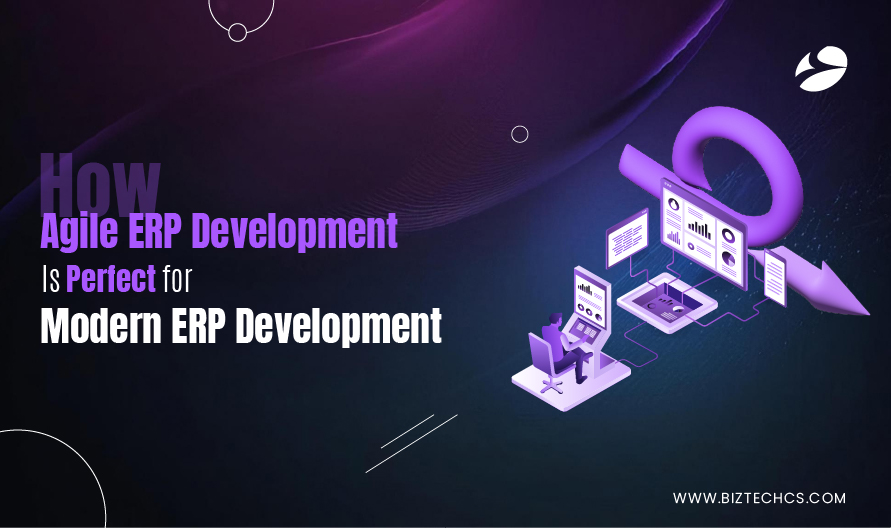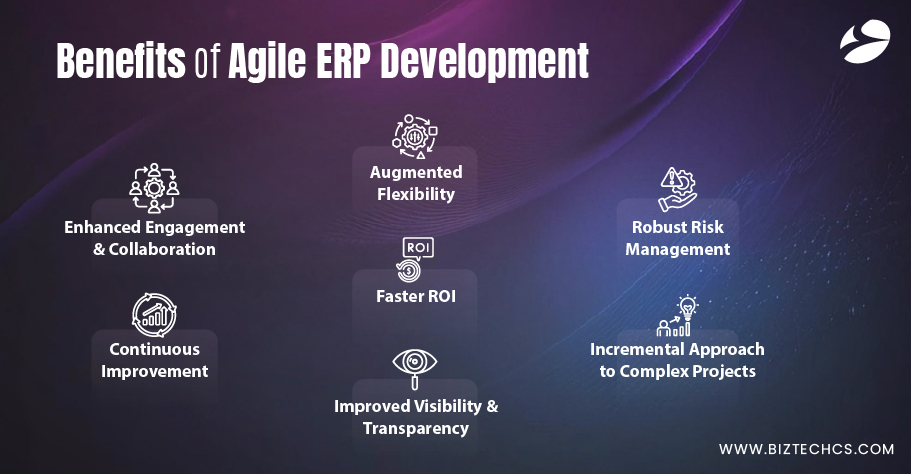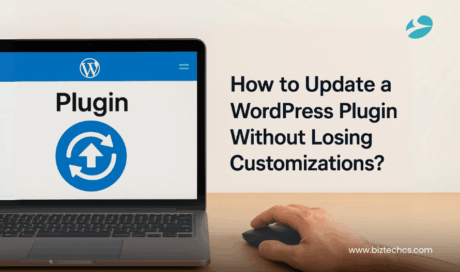1653
How Agile ERP Development Is Perfect for Modern ERP Development?
22 Jul, 2024
7 min read
1653
22 Jul, 2024
7 min read
Table of Content

The key concept of agile ERP development is the continuous process of designing, testing, and implementing smaller parts of an ERP system. Once all these aspects are developed successfully, the development team moves on to the next part of the ERP development lifecycle. This ensures no hassle for improvement once a system is built.
The beauty of agile is that the team works closely with the users and stakeholders throughout the development lifecycle, eliminating the feasibility of miscommunication or any negative impact when the product goes live. Each step of the product development is perfectly developed and tested, leaving no room for glitches.
However, this is the basic introduction to the agile methodology; there is much more to know before employing custom ERP development services. In this article, we’ll assess how agile ERP development is the perfect choice for modern ERP development.
Agile software development is an approach to creating ERP solutions that breaks the project into smaller and manageable chunks, known as sprints. The process in every sprint involves plan execution, configuration of the solution, and addressing challenges. It includes some key activities, including data migration, testing, and training the users to ensure the product is competent to meet the requirements of an organization. Agile ERP development is the right choice for those who want to leverage ERP solutions in less amount of time.

Now that we’ve assessed the basics of agile methodology, and a brief about its pros, here is a detailed analysis of the benefits and characteristics of ERP development using agile!
Agile ERP development tends to foster active engagement and collaboration of stakeholders throughout the product development lifecycle. Constant demonstration of the product’s functionalities and continuous feedback from users allows stakeholders to offer uninterrupted inputs and validation. This level of collaboration ensures that the ERP software gets developed excellently and fulfills the comprehensive needs of end-users while aligning with a company’s requirements and vision.
ERP development is a complex and challenging task that involves many stakeholders and business functionalities. The agile approach to software development separates the project into multiple smaller and manageable sprints, making it convenient to address specific functionalities in each iteration. This incremental approach alleviates the risk of overwhelming the development team with large-scale implementation. Agile ERP development ensures a focused and controlled product execution.
Adaptability is one of the benefits of employing Agile methodology in ERP development. It allows businesses to adapt to the ever-evolving market conditions such as continuous tech advancements and expanding customer needs. Adaptability ensures the ERP software remains aligned with your long-term business needs, serving users with the best possible.
Agile ERP implementations foster a culture of constant improvement. The entire team continuously reflects on their progress, intending to seek ways to be more efficient. The approach might include retrospectives at the end of each sprint aiming to pinpoint the feasibility of improvement. If there is any scope for improvement they implement it to the next iteration to ensure the product gets better compared to the previous phase.
The agile approach to ERP development delivers functional increments in short sprints that generally last two to four weeks. It allows organizations to leverage a streamlined time-to-value. This is because the modules continue to be developed and delivered throughout implementation. Faster development and deployment of the product empower organizations to experience early and validate the product’s competencies sooner in project development. This accelerated approach to ERP development ensures a faster ROI.
The agile software development approach ensures providing the next level of visibility and transparency into the ERP implementation progress. Continuous sprint reviews, status updates, and retrospectives promote open communication between the ERP development team and the stakeholders. This level of transparency assists in identifying as well as addressing potential roadblocks and potential issues early on in the implementation processes.
Strengthened risk management is a crucial benefit offered by agile software development. Businesses can deliver working modules at the end of each sprint to analyze the functionality of the ERP system and identify potential errors early in the project development. This robust risk management ensures minimizing the feasibility of project failure down the line. Robust risk management makes ERP development easier, effortless, and thereby, cost-effective.
There are many benefits of employing agile for ERP development projects for modern-day ERP development. As we discussed above, you’re more likely to have become aware of the benefits of the same. Now, let’s assess the ways or steps to adopt agile ERP implementation for your next project!
Making a clear objective is the foundation of a successful project. Before starting the development, consider establishing a crystal-clear objective you want to accomplish. Properly understanding your business needs, project scope, and desired outcomes is crucial. It helps you remain focused on your business’s goals, preventing you from wandering in between the project development lifecycle. Besides, creating a cross-functional agile development team with representatives from different departments like IT, finance, operations, and human resources, ensures a wider expertise and collaboration in the team.
After you’ve understood the project scope and requirements, consider planning the project. Planning and setting up a clear plan helps you remain on track throughout development. The project planning consists of defining a clear project objective, creating a cross-functional team, and assessing and selecting the right framework. Besides, providing frequent integration and testing, and fostering collaboration among the stakeholders are also the parts of the project planning.
Employing this approach, enhances responsiveness, flexibility, and adaptability, and drives successful ERP development providing value to the organization.
Agile software development follows an iterative development procedure. It breaks the project into different, smaller, and manageable chunks, called sprints. This phase of agile ERP development involves separating the project into iterative sprints like plan execution, product configuration, and addressing technical challenges. The primary activities in this phase include migrating data, training users, and conducting thorough testing of the product to ensure it meets the requirements that a business may expect. A successful software ensures its functionality aligns with the needs of its users, delivering the desired results. It sets the state for efficient and effective operation.
The deployment phase involves efficient rollout and integration of ERP software. It includes ERP configuration, data migration, and training users on agile practices. Deployment focuses on user involvement, iterative delivery, and constant improvement. It ensures seamless adaptability to ever-evolving business needs. The agile ERP deployment enables organizations to boost efficiency, collaboration, and responsiveness, establishing a robust foundation for value-driven implementation.
Frequent iteration and testing is one of the crucial elements of agile software development. It includes continuous integration and testing of the ERP system’s latest version to ensure there’s no error in the product, ensuring an error-free ERP development and deployment.
It includes frequently accumulating feedback from stakeholders and users after each integration. The feedback is utilized for making plans and priorities for the next phase accordingly. It ensures continuous improvement in the ERP system, making it adaptable according to an organization’s needs and preferences.
Enhanced engagement and collaboration, improved, flexibility, continuous improvement, faster ROI, and whatnot. Agile ERP development is an excellent choice for modern ERP development for many reasons. This approach to ERP development boasts continuous assessment, accumulating feedback from users and stakeholders and using it to improve the system for better functionality and outcome. Agile is the right approach for both developers and businesses looking for ERP development.
If you want to build an ERP system for your business using agile methodology, we’re at your service to help you with that. At BiztechCS we provide comprehensive agile ERP development solutions to businesses across the world. Using our expertise, we engineer the ERP system that matches your needs and preferences the best. Contact us to get a free quote!

Development
114
By Devik Gondaliya
09 Jul, 2025

Odoo
7807
By Biztech
04 Jul, 2025
Odoo
451
By Devik Gondaliya
02 Jul, 2025